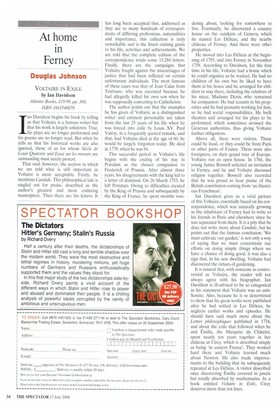At home in Femey
Douglas Johnson
VOLTAIRE IN EXILE by Ian Davidson Atlantic Books, £19.99, pp. 368, ISBN 1843540878 IanDavidson begins his book by telling us that Voltaire is a famous writer but that his work is largely unknown. True, his plays are no longer performed and his poems are no longer read. But when he tells us that his historical works are also ignored, those of us for whom Siècle de Louis Quatorze and Essai sur les moeurs are outstanding must surely protest.
That said, however, the section in which we are told what is still important in Voltaire is more acceptable. Firstly, he mentions Candide. This philosophical tale is singled out for praise, described as the author's greatest and most enduring masterpiece. Then there are his letters. It
has long been accepted that, addressed as they are to many hundreds of correspondents of differing professions, nationalities and importance, this collection is truly remarkable and is the finest existing guide to his life, activities and achievements. We are told that the complete edition of the correspondence totals some 15,284 letters. Finally, there are the campaigns that Voltaire fought against the miscarriages of justice that had been inflicted on certain unfortunate individuals. The most famous of these cases was that of Jean Calas from Toulouse, who was executed because he had allegedly killed his own son when he was supposedly converting to Catholicism.
The author points out that the examples he has given of Voltaire as a distinguished writer and eminent personality are taken from the last 25 years of his life when he was forced into exile by Louis XV. Paul Valery, in a frequently quoted remark, said that, had Voltaire died at the age of 60, he would be largely forgotten today. He died in 1778, when he was 84.
This successful period in Voltaire's life begins with the ending of his stay in Potsdam as the chosen companion to Frederick of Prussia. After almost three years, his disagreements with the king led to a letter of dismissal. On 26 March 1753, he left Potsdam. Owing to difficulties created by the King of Prussia and subsequently by the King of France, he spent months wan dering about, looking for somewhere to live. Eventually, he discovered a country house on the outskirts of Geneva, which he named Les D6lices, and the nearby château of Ferney. And there were other properties.
He moved into Les Daces at the beginning of 1755, and into Ferney in November 1758. According to Davidson, for the first time in his life, Voltaire had a home which he could organise as he wanted. He had no children of his own but he liked to have them in his house and he arranged for children to stay there, including the relatives of his niece, Madame Denis, who remained his companion. He had tenants in his properties and he had peasants working for him, so he had social responsibilities. He built theatres and arranged for his plays to be performed, which sometimes aroused the Genevan authorities, thus giving Voltaire further obligations.
Above all, there were visitors. These could be local, or they could be from Paris or other parts of France. There were also foreigners, on their grand tour of Europe. Voltaire ran an open house. In 1764, the young James Boswell solicited an invitation to Ferney, and he and Voltaire discussed religion together. Boswell also recorded that he was proud to hear praise of the British constitution coming from 'an illustrious Frenchman'.
Ian Davidson gives us a vivid picture of this Voltaire, essentially based on his correspondence, which was naturally growing as the inhabitant of Ferney had to write to his friends in Paris and elsewhere since he was separated from them. It is a pity that he does not write more about Candide, but he points out that the famous conclusion, 'We must cultivate our garden,' is not only a way of saying that we must concentrate OUT efforts on doing simple things where we have a chance of doing good, it was also a sign that, in his new dwelling, Voltaire had discovered the virtues of gardening.
It is natural that, with someone as controversial as Voltaire, the reader will not always agree with his biographer. Ian Davidson is ill-advised to be so categorical in his statement that Voltaire was an antiSemite. Also, because he is so determined to show that his great works were published after he had settled in Les Daces, he neglects earlier works and episodes. He should have said much more about the Lettres philosophiques published in 1734, and about the exile that followed when he and Emilie, the Marquise du Chatelet, spent nearly ten years together in her château at Cirey, which is described simply as being 'in eastern France'. They worked hard there and Voltaire learned much about Newton. He also made improvements to the building that he subsequently repeated at Les Daces. A visitor described once discovering Emilie covered in jewels but totally absorbed by mathematics. In a book entitled Voltaire in Exile, Cirey deserves more than ten lines.


























































 Previous page
Previous page